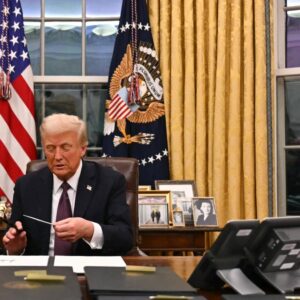
Introduction
Senator Rand Paul (R-KY) has emerged as a prominent Republican voice opposing former President Donald Trump’s tariff policies. While many GOP lawmakers have supported Trump’s protectionist trade measures, Paul has consistently criticized tariffs as detrimental to American consumers and businesses. His stance has sparked discussions within the Republican Party about the balance between free-market principles and national economic strategies.
The Libertarian Perspective on Tariffs
Paul, known for his libertarian views, has long argued that tariffs are essentially taxes on consumers. He contends that imposing tariffs increases the cost of imported goods, which ultimately burdens American families. In 2018, Paul emphasized that tariffs “punish American consumers and producers,” advocating for the removal of tariffs rather than providing subsidies to affected industries .
Internal GOP Resistance
Despite the party’s general alignment with Trump’s economic policies, Paul has actively sought to organize Republican senators against the administration’s tariff strategies. In a closed-door Senate luncheon, he presented data illustrating how free trade has contributed to economic mobility, urging his colleagues to reconsider the long-term impacts of protectionist measures
Economic Impacts on Kentucky
As a senator from Kentucky, Paul is particularly attuned to how tariffs affect local industries. The state’s bourbon industry, a significant export, has faced challenges due to retaliatory tariffs from the European Union. Paul has highlighted that such measures jeopardize Kentucky’s economy, emphasizing the need for trade policies that protect American businesses without resorting to protectionism
Critique of Subsidies for Affected Industries
Paul has been vocal in his criticism of providing subsidies to industries harmed by tariffs. He argues that offering financial aid to farmers and manufacturers affected by trade policies does not address the root cause—the tariffs themselves. Instead, he advocates for the removal of tariffs to allow markets to function freely and efficiently
Bipartisan Concerns and Legislative Efforts
The impact of tariffs has also prompted bipartisan concern. Senators Chuck Grassley and Maria Cantwell introduced legislation requiring congressional approval for tariffs within 60 days, aiming to reassert legislative authority over trade policies . This move reflects growing apprehension about the executive branch’s expanding influence over trade decisions
Conclusion
Senator Rand Paul’s opposition to Trump’s tariff policies underscores a significant debate within the Republican Party regarding trade and economic strategy. His advocacy for free trade and criticism of protectionist measures highlight the complexities of balancing national economic interests with global market dynamics. As discussions continue, Paul’s stance may influence future trade policies and the party’s approach to economic governance.






